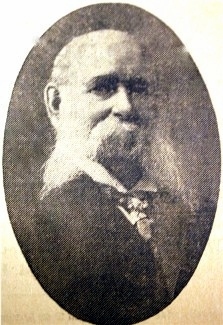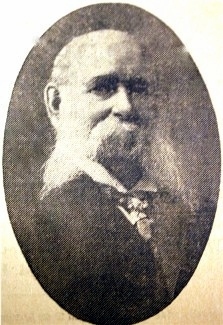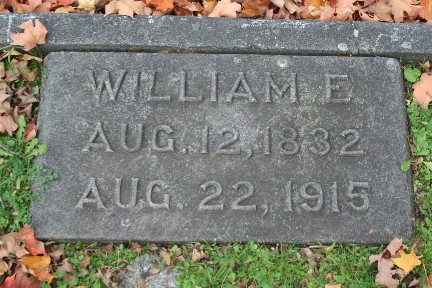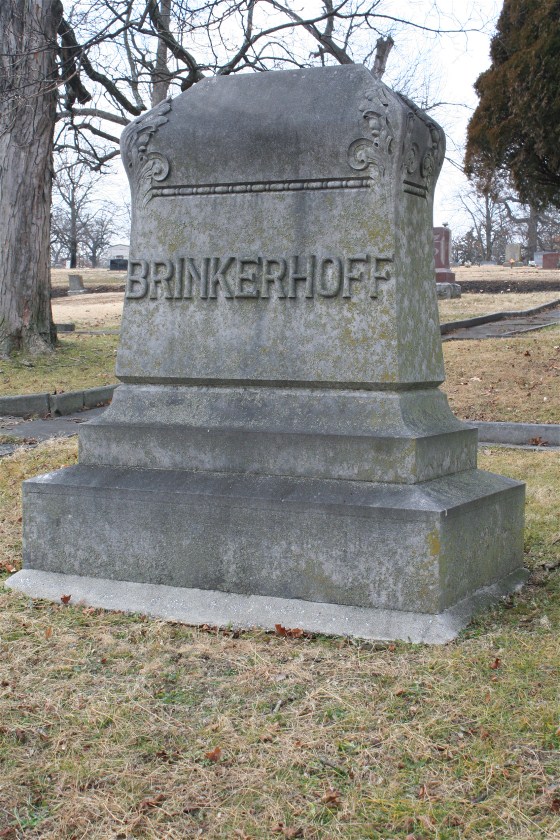h/o Eliza Wicks.
William E Brinkerhoff
1141 South Grand Avenue
Carthage, MO
FATHER: John L. Brinkerhoff
Birthplace: New York
MOTHER: Sophia Platt Brinkerhoff
Birthplace: Harrington, Illinois
He was married in September, 1866 to Miss Eliza Wicks, of Long Island, N.Y. She preceded him in death.
They had 8 children, 7 girls and 1 boy.
He was 83 years at the time of his death
Burial was at Park Cemetery, Carthage, MO on August 25, 1915 under the direction of Knell Undertaking Company
NOTE: The death certificate can be viewed at Missouri Digital Archives/death certificates online website.
_________________
From the archives of...
THE CARTHAGE EVENING PRESS
JUNE 30, 1892
W. E. Brinkerhoff
W. E. Brinkerhoff, president of the First National bank, is a descendant of one of the oldest Knickerbocker families in New York City; his ancestors having emigrated from Holland to New York (then New Amsterdam) in 1638. He was born in the suburbs of the city in August, 1832, and made his home in the city from 1850 to 1865, except the period of the Civil War, which was spent int he Union Army. At the close of the war he came west, in consequence of weak lungs to avoid the salt air, and stopping in Clinton, Mo., in May 1865 decided to give it a year's trial. The climate proved favorable and with an elder brother opened the first furniture store, in December 1865, which was a financial success, until disposed of in November 1869 after the death of his brother. In 1867, having become interested somewhat in real estate personally, and having a taste for the business, he opened a real estate office also and soon had a large business to which later was added a farm loan department, and a set of abstracts of title, which had been compiled largely by himself. In the loan business he was the personal agent of eastern lenders, and never lost the friendship or confidence of his customers. He disposed of an interest in that business in the spring of 1882, and continued it at Clinton as a firm until 1887, when it was incorporated, and in October 1889, he disposed of all interest in that business, and gave his whole time to the bank. In the spring of 1882 he, in company with several friends, purchased the Traders Bank of Carthage, a corporation with $20,000 capital, which he increased at once to $30,000, and re-organized becoming its president. After a year's trial the stockholders decided that the bank should have more capital, and it was decided to increase it to $100,000 and procure a charter for a National bank, although to do so made them doubly liable to creditors, while as a state bank in case of disaster they could only lose the stock they owned, but as a National bank, if necessary to pay the bank's liabilities, be assessed as much more in cash as the amount of their stock in addition. The charter was granted and the bank commenced business August 1, 1883, succeeding to the business of the Traders Bank. As all can see by the reports the bank has constantly increased its business to the present time. As the Traders Bank it more than doubled its business, and as the First National it gained from its first statement Dec 31, 1883, of $224,916 to $456,889, May 17, 1892
The newly elected directors of the First National Bank held a meeting last night and elected officers for 1898. Wm. E. Brinkerhoff was re-elected president; Cashier V. A. Wallace was elected vice-president, and ex-Mayor E. B. Jacobs was promoted from assistant cashier to cashier. The promotions were made to fill the vacancy caused by the death of Mr. C. L. Bartlett who was vice-president. (Mornin' Mail)
CIVIL WAR RECORD
At the breaking out of the Civil War he was one of the first to enlist in General Sickle's Excelsior Brigade, in which he served three years as a union soldier.
William E. Brinkerhoff (First_Last)
Regiment Name 71 N. Y. Infantry
Side Union
Company C
Soldier's Rank_In Pvt.
Soldier's Rank_Out Pvt.
UNION NEW YORK VOLUNTEERS
71st Regiment, New York Infantry
Organized under authority of the War Department at Camp Scott, Staten Island, N. Y., as 2nd Regiment, Sickles' Brigade, June, 1861. Left State for Washington, D. C., July 23, 1861. Attached to Sickles' Brigade, Division of the Potomac, to October, 1861. Sickles' Brigade, Hooker's Division, Army of the Potomac, to March, 1862. 2nd Brigade, 2nd Division, 3rd Army Corps, Army of the Potomac, to March, 1864. 2nd Brigade, 4th Division, 2nd Army Corps, to May, 1864. 4th Brigade, 3rd Division, 2nd Army Corps, to July, 1864.
Source: National Park Service
Civil War Soldiers and Sailors Service
⁂∭∭⁂∭∭⁂
CARTHAGE EVENING PRESS August 23, 1915
DEATH OF W.E. BRINKERHOFF
PROMINENT CITIZEN DIES AT AGE OF 83
Organized First National Bank in 1883 and Was It's President for Many Years
William E. Brinkerhoff, who was president of the First Nation Bank of this city from the time of its organization in 1883 until he retired two years ago, died at 9:18 o'clock last night at the Brinkerhoff residence at 1141 Grand. Death was caused from senility and a complication of diseases. He had been confined to his room for about two years and had been critically sick six or seven weeks. He was 83 years old a week ago last Thursday.
From the time he moved to Carthage in July, 1882 until he was forced to give up his business cares on account of failing health, Mr. Brinkerhoff was one of the leading business men and capitalists of this city. In the spring of 1882 he and others purchased the Traders' Bank of this city, and Mr. Brinkerhoff being chosen president of the institution, moved with his family to this city a short time after that, coming here from Clinton. The next year the First National Bank was organized, the charter being granted for it June 16, 1883. Mr. Brinkerhoff being the principal organizer of it, became its president, which office he filled to the entire satisfaction of those connected with it, until he retired.
On his birthday anniversary last August the members of the board of directors of the bank held a meeting and presented him with a gold loving cup as a token of appreciation of the valuable service he had rendered as president of the bank. In presenting the loving cup reference was made to the fact that the success of the bank was to a very great degree due to the man who was its head for 30 years.
The building which now is the home of this bank was erected in 1893 by the bank under the leadership of Mr. Brinkerhoff. Prior to that time the bank had been located two door south of where it now is.
Besides being the father of and for three score years the president of the First National Bank, Mr. Brinkerhoff conducted an extensive loan and real estate business, which extended over a large portion of southwestern Missouri and southeastern Kansas. And he was not merely a financier, but took a live interest in the welfare and progress of the city and was identified with many movements to better the conditions here.
He was a large property owner, and during the active period of his business life in Carthage was identified with a number of mining enterprises in the district. He was president of the Alamo Mining Company, of Joplin, and also headed a number of other mining companies at different times.
Mr. Brinkerhoff was born near New York City August 12, 1832. His parents were natives of that state. His birthplace was the scene of his boyhood and there he received his education. After arriving at his majority he learned the furniture business in New York City. When the Civil War broke out he was one of the first to enlist in General Sickle's Excelsior Brigade, in which he served three years as a soldier. Afterwards he was commissioned quartermaster of the Fifty-sixth New York regiment and served until he close of the war.
In 1865 he moved to Clinton, Mo., where he dealt largely in real estate for a number of years. He served as deputy circuit clerk and recorder from 1865 to 1867. He also was school commission of that county, and did a great deal toward bringing the school system up to the standard which gave the county a great pride in the schools. From 1868 to 1872 he served as county surveyor and was United States commissioner for the following year. He also was a director of the public schools in Clinton from 1872 to 1882, in which year he moved to Carthage.
In September 1866 he was married to Miss Eliza Wicks of Long Island, New York. The wife had been dead about five years, but the following children survive: Mrs. Sam P. Jones of Louisville; Mrs. A. M. Tebbits of Carthage; Mrs. Frank Naughton of Champaign, Illinois; Mrs. H. R. P. Miller of Croton, Ohio; Mrs. George Beimdiek of Carthage; Mrs. Carter R. Bishop of Hollywood, California; W. E. Brinkerhoff, Jr. of Louisville, Kentucky.
The funeral services will be at 2:30 o'clock Wednesday afternoon at the Brinkerhoff residence. Rev. A. J. Van Wagner will be in charge. Burial will be in Park Cemetery.
h/o Eliza Wicks.
William E Brinkerhoff
1141 South Grand Avenue
Carthage, MO
FATHER: John L. Brinkerhoff
Birthplace: New York
MOTHER: Sophia Platt Brinkerhoff
Birthplace: Harrington, Illinois
He was married in September, 1866 to Miss Eliza Wicks, of Long Island, N.Y. She preceded him in death.
They had 8 children, 7 girls and 1 boy.
He was 83 years at the time of his death
Burial was at Park Cemetery, Carthage, MO on August 25, 1915 under the direction of Knell Undertaking Company
NOTE: The death certificate can be viewed at Missouri Digital Archives/death certificates online website.
_________________
From the archives of...
THE CARTHAGE EVENING PRESS
JUNE 30, 1892
W. E. Brinkerhoff
W. E. Brinkerhoff, president of the First National bank, is a descendant of one of the oldest Knickerbocker families in New York City; his ancestors having emigrated from Holland to New York (then New Amsterdam) in 1638. He was born in the suburbs of the city in August, 1832, and made his home in the city from 1850 to 1865, except the period of the Civil War, which was spent int he Union Army. At the close of the war he came west, in consequence of weak lungs to avoid the salt air, and stopping in Clinton, Mo., in May 1865 decided to give it a year's trial. The climate proved favorable and with an elder brother opened the first furniture store, in December 1865, which was a financial success, until disposed of in November 1869 after the death of his brother. In 1867, having become interested somewhat in real estate personally, and having a taste for the business, he opened a real estate office also and soon had a large business to which later was added a farm loan department, and a set of abstracts of title, which had been compiled largely by himself. In the loan business he was the personal agent of eastern lenders, and never lost the friendship or confidence of his customers. He disposed of an interest in that business in the spring of 1882, and continued it at Clinton as a firm until 1887, when it was incorporated, and in October 1889, he disposed of all interest in that business, and gave his whole time to the bank. In the spring of 1882 he, in company with several friends, purchased the Traders Bank of Carthage, a corporation with $20,000 capital, which he increased at once to $30,000, and re-organized becoming its president. After a year's trial the stockholders decided that the bank should have more capital, and it was decided to increase it to $100,000 and procure a charter for a National bank, although to do so made them doubly liable to creditors, while as a state bank in case of disaster they could only lose the stock they owned, but as a National bank, if necessary to pay the bank's liabilities, be assessed as much more in cash as the amount of their stock in addition. The charter was granted and the bank commenced business August 1, 1883, succeeding to the business of the Traders Bank. As all can see by the reports the bank has constantly increased its business to the present time. As the Traders Bank it more than doubled its business, and as the First National it gained from its first statement Dec 31, 1883, of $224,916 to $456,889, May 17, 1892
The newly elected directors of the First National Bank held a meeting last night and elected officers for 1898. Wm. E. Brinkerhoff was re-elected president; Cashier V. A. Wallace was elected vice-president, and ex-Mayor E. B. Jacobs was promoted from assistant cashier to cashier. The promotions were made to fill the vacancy caused by the death of Mr. C. L. Bartlett who was vice-president. (Mornin' Mail)
CIVIL WAR RECORD
At the breaking out of the Civil War he was one of the first to enlist in General Sickle's Excelsior Brigade, in which he served three years as a union soldier.
William E. Brinkerhoff (First_Last)
Regiment Name 71 N. Y. Infantry
Side Union
Company C
Soldier's Rank_In Pvt.
Soldier's Rank_Out Pvt.
UNION NEW YORK VOLUNTEERS
71st Regiment, New York Infantry
Organized under authority of the War Department at Camp Scott, Staten Island, N. Y., as 2nd Regiment, Sickles' Brigade, June, 1861. Left State for Washington, D. C., July 23, 1861. Attached to Sickles' Brigade, Division of the Potomac, to October, 1861. Sickles' Brigade, Hooker's Division, Army of the Potomac, to March, 1862. 2nd Brigade, 2nd Division, 3rd Army Corps, Army of the Potomac, to March, 1864. 2nd Brigade, 4th Division, 2nd Army Corps, to May, 1864. 4th Brigade, 3rd Division, 2nd Army Corps, to July, 1864.
Source: National Park Service
Civil War Soldiers and Sailors Service
⁂∭∭⁂∭∭⁂
CARTHAGE EVENING PRESS August 23, 1915
DEATH OF W.E. BRINKERHOFF
PROMINENT CITIZEN DIES AT AGE OF 83
Organized First National Bank in 1883 and Was It's President for Many Years
William E. Brinkerhoff, who was president of the First Nation Bank of this city from the time of its organization in 1883 until he retired two years ago, died at 9:18 o'clock last night at the Brinkerhoff residence at 1141 Grand. Death was caused from senility and a complication of diseases. He had been confined to his room for about two years and had been critically sick six or seven weeks. He was 83 years old a week ago last Thursday.
From the time he moved to Carthage in July, 1882 until he was forced to give up his business cares on account of failing health, Mr. Brinkerhoff was one of the leading business men and capitalists of this city. In the spring of 1882 he and others purchased the Traders' Bank of this city, and Mr. Brinkerhoff being chosen president of the institution, moved with his family to this city a short time after that, coming here from Clinton. The next year the First National Bank was organized, the charter being granted for it June 16, 1883. Mr. Brinkerhoff being the principal organizer of it, became its president, which office he filled to the entire satisfaction of those connected with it, until he retired.
On his birthday anniversary last August the members of the board of directors of the bank held a meeting and presented him with a gold loving cup as a token of appreciation of the valuable service he had rendered as president of the bank. In presenting the loving cup reference was made to the fact that the success of the bank was to a very great degree due to the man who was its head for 30 years.
The building which now is the home of this bank was erected in 1893 by the bank under the leadership of Mr. Brinkerhoff. Prior to that time the bank had been located two door south of where it now is.
Besides being the father of and for three score years the president of the First National Bank, Mr. Brinkerhoff conducted an extensive loan and real estate business, which extended over a large portion of southwestern Missouri and southeastern Kansas. And he was not merely a financier, but took a live interest in the welfare and progress of the city and was identified with many movements to better the conditions here.
He was a large property owner, and during the active period of his business life in Carthage was identified with a number of mining enterprises in the district. He was president of the Alamo Mining Company, of Joplin, and also headed a number of other mining companies at different times.
Mr. Brinkerhoff was born near New York City August 12, 1832. His parents were natives of that state. His birthplace was the scene of his boyhood and there he received his education. After arriving at his majority he learned the furniture business in New York City. When the Civil War broke out he was one of the first to enlist in General Sickle's Excelsior Brigade, in which he served three years as a soldier. Afterwards he was commissioned quartermaster of the Fifty-sixth New York regiment and served until he close of the war.
In 1865 he moved to Clinton, Mo., where he dealt largely in real estate for a number of years. He served as deputy circuit clerk and recorder from 1865 to 1867. He also was school commission of that county, and did a great deal toward bringing the school system up to the standard which gave the county a great pride in the schools. From 1868 to 1872 he served as county surveyor and was United States commissioner for the following year. He also was a director of the public schools in Clinton from 1872 to 1882, in which year he moved to Carthage.
In September 1866 he was married to Miss Eliza Wicks of Long Island, New York. The wife had been dead about five years, but the following children survive: Mrs. Sam P. Jones of Louisville; Mrs. A. M. Tebbits of Carthage; Mrs. Frank Naughton of Champaign, Illinois; Mrs. H. R. P. Miller of Croton, Ohio; Mrs. George Beimdiek of Carthage; Mrs. Carter R. Bishop of Hollywood, California; W. E. Brinkerhoff, Jr. of Louisville, Kentucky.
The funeral services will be at 2:30 o'clock Wednesday afternoon at the Brinkerhoff residence. Rev. A. J. Van Wagner will be in charge. Burial will be in Park Cemetery.
Family Members
-
![]()
Florence E. Brinkerhoff
1868–1870
-
![]()
Willie H. Brinkerhoff
1870–1872
-
![]()
Mary Burdett Brinkerhoff Tebbetts
1873–1952
-
![]()
Cora Evangeline Brinkerhoff Naughton
1874–1955
-
![]()
Ida Brinkerhoff Beimdiek
1877–1926
-
![]()
Anna Wallace Brinkerhoff Miller
1877–1934
-
![]()
Grace Davis Brinkerhoff Lehnhard
1880–1913
-
![]()
Elwyn Brinkerhoff
1886–1964
Sponsored by Ancestry
Advertisement
Explore more
Sponsored by Ancestry
Advertisement














